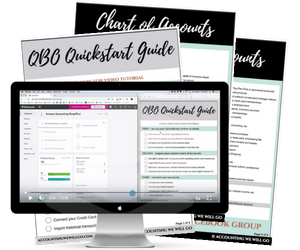Whether you are doing the bookkeeping for your Amazon business or you have hired someone to do it for you, it is important that you understand how to check the work for completeness and accuracy.
Having an e-commerce business is exciting, and with it comes a great deal of responsibility. Not only are you responsible for sourcing inventory, you are getting it to market by creating listings on eBay or Amazon, you are shipping in inventory to fulfillment centers if selling via FBA, you are responding to customer questions, possibly managing employees and/or virtual assistants, and keeping up with receipts and your accounting.
If you haven’t begun to manage your accounting, or if you’ve fallen behind and don’t know how to get organized, enter your information below to get our FREE QBO Quickstart Guide including a video tutorial and Chart of Accounts specific to your e-commerce business to help you set up an accounting system with QuickBooks Online.
NEED HELP WITH YOUR QBO SETUP?
Grab our FREE QBO Quickstart Guide with video tutorial and Chart of Accounts.
Now that you are off to a good start, let’s dig in!
Bookkeeping (the only word in the English language with three double letters in a row) is the process of keeping the records of the financial affairs of a business.
Bookkeeping tasks can be performed by a bookkeeper, an accountant, or a Certified Public Accountant (CPA).
A bookkeeper is a person who may or may not have a college degree in accounting.
An accountant typically has a college degree in accounting.
A Certified Public Accountant (CPA) has a college degree in accounting, usually an advanced degree such as a Master's Degree, and has passed a ridiculously difficult test (in the past spanning over two days, taken in pencil, and only offered twice a year,) has practiced over a certain number of hours under another CPA, and is licensed by his or her state. If a CPA is licensed to practice in one state, he/she is not automatically licensed to practice elsewhere, although some states have reciprocal agreements under certain circumstances.
Not all CPAs prepare taxes, some do not prepare taxes at all, and not all CPAs who prepare taxes are willing to prepare taxes for an e-commerce or other inventory-based business.
It is important to remember how crucial the bookkeeping function is. The bookkeeper is preparing the underlying details that flow into your tax return. If the bookkeeping is bad, it will be an issue of "GIGO" (garbage in, garbage out,) so please be sure you have a bookkeeper who is proficient and competent.
Also, some bookkeepers are of very high caliber and can perform bookkeeping tasks as well as, if not better, than a CPA. However, because bookkeepers and accountants are not licensed, there may be no recourse if you use a bookkeeper who is inadequate.
Please be sure if you work with a bookkeeper or an accountant, that they have proper liability insurance. It is usually referred to as “Errors and Omissions Insurance” (E&O Insurance.) All accounting professionals, whether licensed or not, should carry this insurance. If they do not, please proceed with caution.
And remember even if your bookkeeper is your CPA, you still have responsibility to make sure your books are accurate. Your tax return is your responsibility, even if you pay a CPA to prepare it for you.
It is my recommendation that you have at least a basic understanding of how a proper bookkeeping system should work before you outsource your accounting. Without that knowledge, you will be unable to determine if your transactions have been imported and categorized properly, if your revenue payments are accurate, including fees, if Cost of Goods Sold (“COGS”) is correct, and if your statements have been reconciled as they should be.
I think bookkeeping is an excellent task to outsource. It can be done remotely, you and your bookkeeper can both review activity in your software at the same time, and the tasks are relatively routine. It is often easier to outsource a black-and-white task such as bookkeeping as opposed to tasks that require the skill and knowledge and experience you need to have to sell online.
Once you have outsourced your bookkeeping, it is important to keep an eye on things. Here is what I suggest you review regularly.
1. Bank Feeds - are all bank feeds working? If not, have you been notified to reestablish them? If not, why not?
2. Categorization - when financial documents are ready for your review (meaning the work for the period is complete), are there any uncategorized transactions remaining? There should not be any uncategorized transactions when your financial statements are complete.
3. Sales Deposit - have these deposits been adjusted to reflect the fact that gross sales - fees = cash in bank? In other words, if you are an Amazon seller and your deposit is $4,250, your sales were greater than that because fees were taken out first, and the remainder was remitted to you. Verify your sales numbers by spot checking Amazon settlement statements, eBay reports, and other revenue reports from your various e-commerce platforms.
4. Cost of Goods Sold (COGS) - has COGS been recorded at month end? Does your inventory on hand value on the balance sheet seem about right? If either of these numbers do not seem right, even intuitively, it's very important to stop and check. COGS is the largest expense of your financials and on your tax return. If it seems off during the year, stop and figure out what is going on.
5. Reconciliations - this is THE most important thing to check each month. Even if you don't check anything else, check the reconciliation report. The reconciliation ensures that all transactions are in your accounting software, for the right amount, that none are missing or double counted. It is important to check two things:
a. Review the reconciliation report to ensure all bank, credit card, and loan accounts have been reconciled for each month and that there are no changes you don't understand. Below are two examples of reconciliation reports.
In QBO: Accounting > Reconcile > History by Account (to confirm reconciliation of each account by date and review list of changes)
or:
Accounting > Reconcile > Summary (to review a list of all accounts and the date of last reconciliation.)
Here is an example of a reconciliation report, "History by Account," and this one has changes (which is what you do NOT want to see.) If you look carefully at the column labeled "CHANGES," you will see that July, August, and September are not 0.00 in the changes column. These changes must be explained by your bookkeeper and understood by you. Often, when you see a change on this report, the only resolution is to undo the reconciliations and redo them properly. Changes usually indicate a transaction (or several) that have been changed after the reconciliation is completed, which is generally a bad idea.
To wrap up, it is my recommendation to consider outsourcing your bookkeeping tasks to either a bookkeeper, accountant, or CPA. Time is valuable. Consider what you are “earning” an hour, consider how long it takes you to do your bookkeeping, and from that, you can determine if you are saving money by outsourcing it. Whether you do it yourself or hire a professional to do it for you, be sure you understand enough of the process so that you can check your own work or the work of someone else.
Most importantly, if you haven’t begun to manage your accounting, or if you’ve fallen behind and don’t know how to get organized, enter your information below to download our FREE QBO Quickstart Guide to get you started using QuickBooks Online, including a video tutorial and Chart of Accounts specific to your Amazon FBA business.





